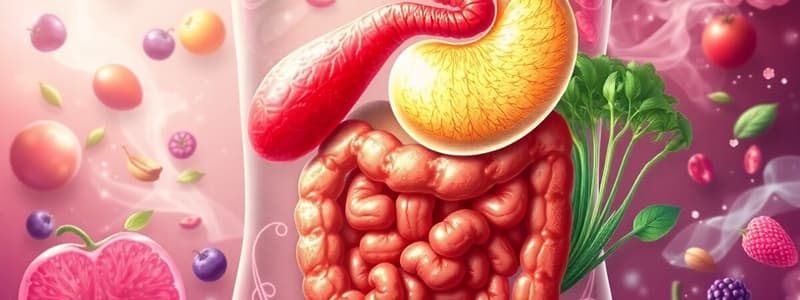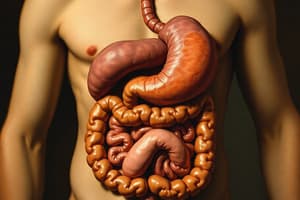Podcast
Questions and Answers
What is the main focus of the learning objectives regarding the digestive system?
What is the main focus of the learning objectives regarding the digestive system?
- To evaluate the effects of dehydration on digestion
- To describe the process of digestion in human beings (correct)
- To analyze the absorption of nutrients in cells
- To understand the energy conversion in the body
Which aspect is most likely emphasized for all students in the learning objectives?
Which aspect is most likely emphasized for all students in the learning objectives?
- List the types of digestive enzymes
- The importance of a healthy diet (correct)
- Understanding the role of vitamins in digestion
- Comparing digestion in different species
What can most students expect to learn about the digestive system?
What can most students expect to learn about the digestive system?
- How to create a balanced diet plan
- Organs of the digestive system and their functions (correct)
- The psychological effects of eating
- The methods of preserving food
Which of the following is a potential activity for students learning about digestion?
Which of the following is a potential activity for students learning about digestion?
What is a key difference between mechanical and chemical digestion that students might compare?
What is a key difference between mechanical and chemical digestion that students might compare?
What is the primary function of the digestive system?
What is the primary function of the digestive system?
Which statement regarding digestion is most accurate?
Which statement regarding digestion is most accurate?
Which of these processes is NOT part of digestion?
Which of these processes is NOT part of digestion?
During digestion, what is the role of enzymes?
During digestion, what is the role of enzymes?
What best describes the term 'absorption' in the digestive process?
What best describes the term 'absorption' in the digestive process?
Which organ is primarily responsible for the majority of nutrient absorption?
Which organ is primarily responsible for the majority of nutrient absorption?
What consequence may arise from improper digestion?
What consequence may arise from improper digestion?
What is the outcome of effective digestion?
What is the outcome of effective digestion?
Flashcards
Digestive System
Digestive System
The system in the body that breaks down food into smaller nutrients for the body to absorb.
Healthy diet
Healthy diet
A balanced intake of nutrients essential for good health.
Food nutrients
Food nutrients
Components of food that provide energy and building blocks for the body.
Mechanical digestion
Mechanical digestion
Signup and view all the flashcards
Chemical digestion
Chemical digestion
Signup and view all the flashcards
Digestive System
Digestive System
Signup and view all the flashcards
Digestion
Digestion
Signup and view all the flashcards
Absorption
Absorption
Signup and view all the flashcards
Nutrients
Nutrients
Signup and view all the flashcards
Physical Digestion
Physical Digestion
Signup and view all the flashcards
Chemical Digestion
Chemical Digestion
Signup and view all the flashcards
Waste Removal
Waste Removal
Signup and view all the flashcards
Essential Nutrients
Essential Nutrients
Signup and view all the flashcards
Study Notes
Digestive System Overview
- The digestive system processes ingested food physically and chemically. This process provides the body with absorbable nutrients and eliminates waste products.
Learning Objectives
- All: Understand the importance of healthy diets.
- Most: Identify organs and their digestive functions.
- Some: Compare the mechanical and chemical aspects of digestion.
Digestive System Organs
- Mouth: Mechanical and chemical digestion begins here. Food is chewed and mixed with saliva, containing enzymes for carbohydrate digestion. Saliva moistens food.
- Esophagus: Food travels down the esophagus using rhythmic muscle contractions (peristalsis).
- Stomach: The stomach has both mechanical and chemical digestion. Enzymes and acids in gastric juices break down food. The stomach churns food to mix it with juices. Chyme (a semi-liquid substance) is formed.
- Small Intestine: Most nutrient absorption occurs in the small intestine, especially in the duodenum. Villi increase the surface area for nutrient absorption into the bloodstream.
- Liver and Gallbladder: The liver produces bile which helps in the breakdown and absorption of fats.
- Pancreas: Produces digestive enzymes to break down carbohydrates, proteins, and fats in the small intestine. It also regulates blood sugar levels by producing insulin and glucagon.
- Large Intestine: Water is absorbed here. Waste material forms feces. Beneficial bacteria aid in digestion and vitamin production.
- Rectum: Temporary storage for feces before elimination.
- Anus: Elimination of waste (feces).
Balanced Diet and Food Nutrients
- Balanced Diet (not a single food source): Eating a variety of foods to obtain all necessary nutrients in the correct amounts.
- Energy Source: Carbohydrates are the primary energy source.
- Protein Function: Growth and repair of tissues.
- Vitamins and Minerals: Fight off illnesses, infections and vital processes.
- Fiber's importance: Aids in digestion.
- Calcium Source: Milk and dairy products are good sources of calcium for strong bones.
- Fruits/Vegetables Benefits: Provide vitamins, minerals, fiber.
- Limit High Calorie Foods: Sugar and fatty foods.
- Water Intake: 4-6 cups of water daily are recommended.
Studying That Suits You
Use AI to generate personalized quizzes and flashcards to suit your learning preferences.




